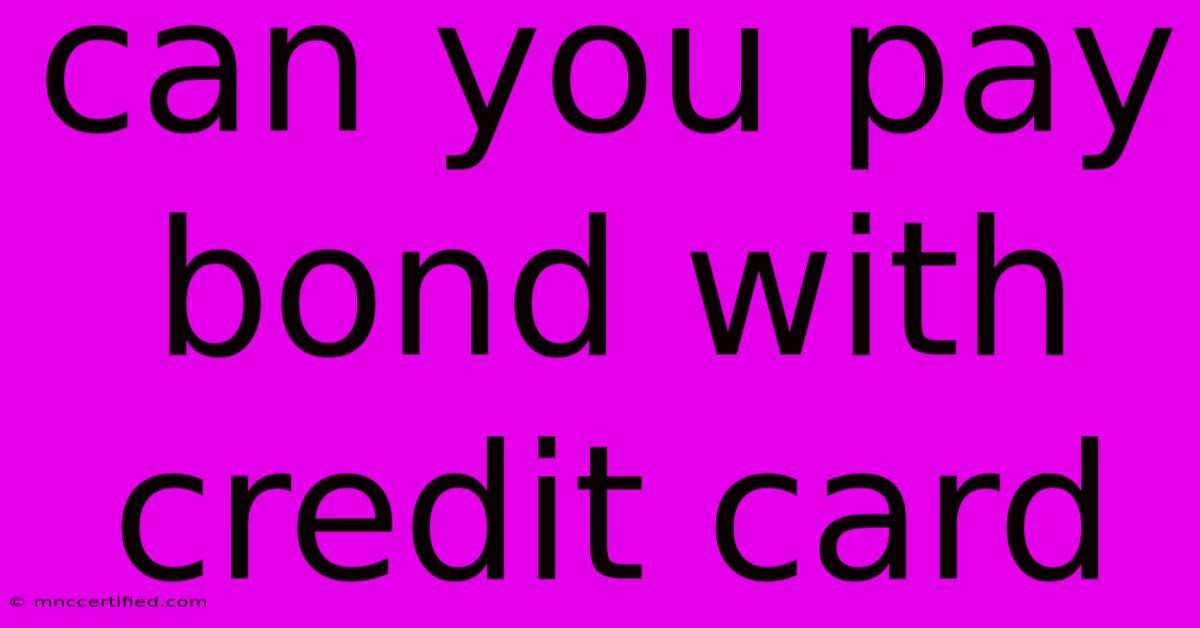Can You Pay Bond With Credit Card

Table of Contents
Can You Pay Bond with a Credit Card? A Comprehensive Guide
Paying your bond (or bail) can be a stressful experience. The last thing you need is added confusion about payment methods. One frequently asked question is: can you pay bond with a credit card? The short answer is: sometimes, but not always. This guide will delve into the intricacies of paying bond using credit cards, exploring the pros, cons, and crucial factors to consider.
Understanding Bond Payment Options
Before we address credit card payments, let's clarify what constitutes "bond" in this context. We're referring to bail bonds, typically required for release from custody pending a court appearance. The specifics of payment methods vary significantly depending on:
- Jurisdiction: State and local laws dictate accepted payment options. Some jurisdictions are more technologically advanced and readily accept credit cards, while others might only accept cash, cashier's checks, or money orders.
- Bail Bondsman Involvement: If you're using a bail bondsman, their policies will influence payment options. Many bondsmen accept credit cards, but usually charge a fee.
- Court System Procedures: The specific court handling your case will have established procedures for bond payment. Always confirm acceptable methods directly with the court.
Paying Bond with a Credit Card: The Possibilities
While not universally accepted, using a credit card for bond payment is increasingly becoming an option, particularly when dealing with:
-
Bail Bonds Agencies: Many bail bonds agencies readily accept credit cards, often processing payments via online portals or over the phone. However, be prepared for substantial fees, often 10% or more of the bond amount. These fees can significantly increase your overall cost.
-
Online Bail Payment Systems: Some jurisdictions utilize online systems that facilitate bail payments, sometimes including credit card options. However, these systems aren't ubiquitous, and their availability is dependent on your location and the specific court.
-
Directly with the Court (Rare): In limited cases, courts themselves may accept credit card payments. This is less common, and you should always confirm this possibility with the court directly before attempting payment.
The Pros and Cons of Using a Credit Card
Pros:
- Convenience: Paying with a credit card can be incredibly convenient, especially during a stressful situation. It eliminates the need to obtain cash or a cashier's check.
- Building Credit: If you pay your credit card balance promptly, using it for bond payment can contribute positively to your credit score.
Cons:
- High Fees: The biggest drawback is the hefty processing fees levied by bail bonds agencies. These fees can significantly increase the overall cost of securing your release.
- Debt Accumulation: Using a credit card means accumulating debt. Failure to repay the balance promptly can lead to high interest charges and negatively impact your credit.
- Potential for Denial: Not all courts or bondsmen accept credit cards, so this payment method isn't always guaranteed.
Alternative Payment Methods
If a credit card isn't feasible, explore these alternative options:
- Cash: Cash is typically the most widely accepted form of payment.
- Cashier's Check or Money Order: These provide a secure and verifiable payment method.
- Wire Transfer: Some courts might accept wire transfers.
Before You Pay: Crucial Steps
- Verify Accepted Payment Methods: Always confirm acceptable payment methods directly with the court or the bail bonds agency before attempting to make a payment.
- Understand Fees: Inquire about all associated fees before proceeding with a credit card payment.
- Read the Fine Print: Carefully review all terms and conditions before submitting payment.
- Keep Records: Maintain copies of all payment confirmations and receipts.
Conclusion: Weigh the Costs and Benefits Carefully
While paying bond with a credit card might offer convenience, the high fees and potential for debt accumulation should be carefully considered. Explore all available payment options and choose the method best suited to your financial situation and circumstances. Prioritizing responsible financial management, even during a crisis, is crucial. Remember to always confirm acceptable payment methods with the relevant authorities before proceeding.

Thank you for visiting our website wich cover about Can You Pay Bond With Credit Card. We hope the information provided has been useful to you. Feel free to contact us if you have any questions or need further assistance. See you next time and dont miss to bookmark.
Featured Posts
-
Carpenter Surprises La Fans With Aguilera
Nov 17, 2024
-
Al Musbah Aluminium Trading Co Llc
Nov 17, 2024
-
Live England Vs South Africa Match Result
Nov 17, 2024
-
Sanders Nfl Coaching Ingrams Inquiry
Nov 17, 2024
-
First Choice Insurance Lindenhurst
Nov 17, 2024